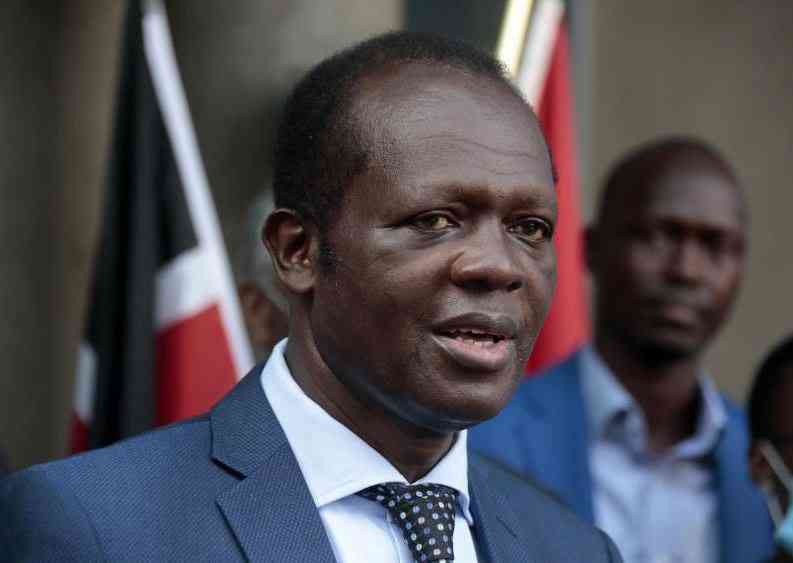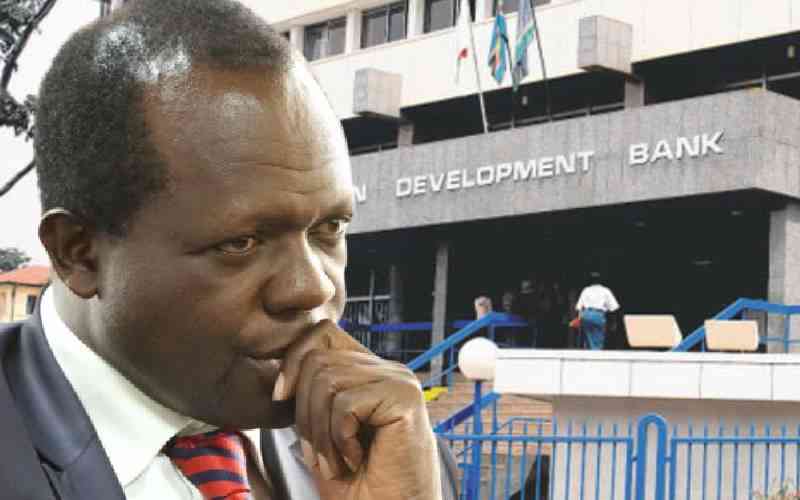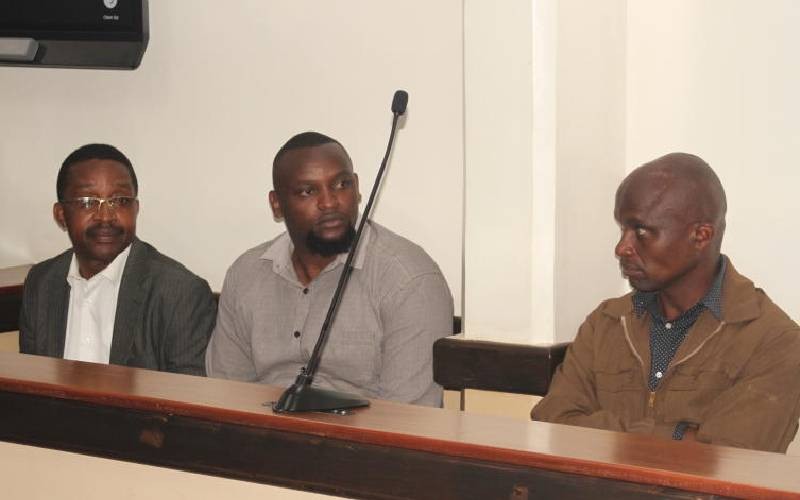
The Supreme Court has dealt former Foreign Affairs minister Raphael Tuju’s firm, Dari Limited, a major blow after dismissing its application to block receivership.
In a ruling on Friday, a five-judge bench of Deputy Chief Justice Philomena Mwilu and Justices Mohamed Ibrahim, Smokin Wanjala, Njoki Ndung’u and William Ouko unanimously agreed that Dari had not proved to the court that East Africa Development Bank (EABD) would be unable to pay in case his case succeeds.
According to the bench, Dari’s worry that the bank would ride on its diplomatic immunity not to honour the orders in case of a win could not be founded.
They ruled that a balance of competing interest is tilted in favour of the regional bank as Dari still owed it Sh1.5 billion.
This is despite it holding Dari’s properties as security and a deposit of Sh50 million held by their lawyers in an interest-earning account.
“We are satisfied that the respondent remains a reputable international bank that should have no difficulty compensating the applicants if the applicants succeed in their claim. The applicants’ apprehension as to the diplomatic immunity afforded to the respondent does not suffice,” the Supreme Court ruled.
Bankruptcy suit
At the heart of the case is whether a United Kingdom judgment in favour of EADB can be recognised and enforced in Kenya.
Tuju is fighting to block receiver managers from his Dari Coffee Garden and Restaurant (which took the loan) while also shaking off a bankruptcy suit brought against him and his three children.
He plans to convince the court that EADB reneged on an agreement they made to advance Dari a total of Sh1.19 billion.
Instead, he claims, the lender only advanced him around Sh800 million for the acquisition of the 20-acre Tree Lane Property to expand his hospitality business at Dari in Karen Estate, Nairobi.
Further, he claims that the lender reneged on adding up 294 million for the development of 30 three-bedroomed senior resident units at Tree Lane and another 85-bedroomed maisonette at a nearby seven-acre land on Mwitu Road.
Tuju says not only did the bank refuse to advance Dari the money, but it also frustrated all his efforts to amicably bring this issue to a close.
But for EADB, Tuju was offered a loan and should honour his debt obligation.
Stay informed. Subscribe to our newsletter
EADB is demanding Sh1.6 billion – including the principal amount and accrued interest - from Tuju and his three children Yma Tuju, Alma Tuju, and Mano Tuju, who are also directors at Dari. The four also personally guaranteed the loan.
Nevertheless, the former Rarieda Member of Parliament says that the UK judgment is defective and unconstitutional.
While poking holes in the judgment, he argues that the verdict cannot stand as Justice Daniel Toledano and EADB’s lawyer Michael Sullivan are both members of One Essex Court Chambers, a commercial law firm in the UK.
Tuju faults the Commercial Court for allowing EADB to enforce the judgment in Kenya saying that Justice Wilfrida Okwany failed to consider his grievance on how the proceedings in the UK were conducted.
While denying the allegations, EADB lawyers Githu Muigai, Michael Sullivan, and former Uganda Solicitor General Peter Kabatsi argue that the politician had lost the battle in the UK, first before the High Court and his appeal.
According to the trio, Tuju ought to have sought recourse in the UK and not a Kenyan Court.
EADB lawyers told the court that Tuju was seeking to review the orders of the UK Court.
The court heard that he has not made any payments or showed a commitment to offset the loan.
According to Githu, Tuju participated in the UK case, and was allowed to even fight on appeal.
He argued that the politician is trying to re-open the case afresh in Kenya, in a bid to deny his client an opportunity to recover its money.
“The judgment debtor (Tuju) had an opportunity to advance his case in the United Kingdom and which he lost. He cannot be heard to again say here in Kenya that he was not given a fair hearing,” argued Githu.
Barristers and Solicitors
On the EABD’s lawyer and the judge sharing a chamber, Githu distinguished that the practice in the UK is different from Kenya. He explained that in the UK, there are two types of lawyers- Barristers and Solicitors.
He said that Solicitors own law firms while barristers are lone lawyers who share a building, but have different chambers, clients and practice separately.
According to Githu, Toledano and Sullivan are barristers hence could not meet or interact as they have separate chambers.
Tuju asserts that his agreement with EADB was that it would provide a $9.3 million (Sh943.9 million) loan to buy a property known as Tree Lane and would subsequently provide Sh 294 million to develop it.
Tuju that EADB was to provide Sh 294 million for construction but it kept shifting goals, which in turn frustrated efforts to effectively run the project.
 The Standard Group Plc is a
multi-media organization with investments in media platforms spanning newspaper
print operations, television, radio broadcasting, digital and online services. The
Standard Group is recognized as a leading multi-media house in Kenya with a key
influence in matters of national and international interest.
The Standard Group Plc is a
multi-media organization with investments in media platforms spanning newspaper
print operations, television, radio broadcasting, digital and online services. The
Standard Group is recognized as a leading multi-media house in Kenya with a key
influence in matters of national and international interest.
 The Standard Group Plc is a
multi-media organization with investments in media platforms spanning newspaper
print operations, television, radio broadcasting, digital and online services. The
Standard Group is recognized as a leading multi-media house in Kenya with a key
influence in matters of national and international interest.
The Standard Group Plc is a
multi-media organization with investments in media platforms spanning newspaper
print operations, television, radio broadcasting, digital and online services. The
Standard Group is recognized as a leading multi-media house in Kenya with a key
influence in matters of national and international interest.








